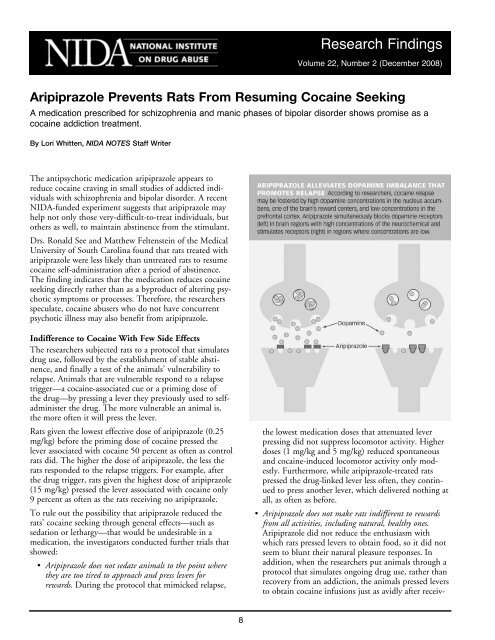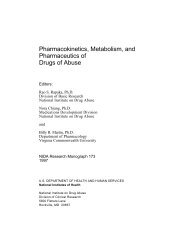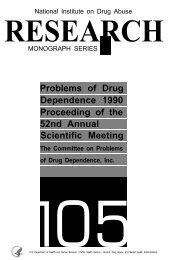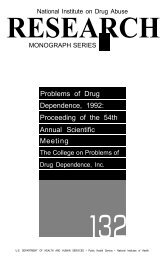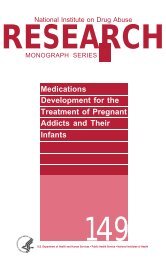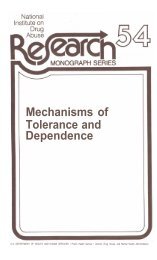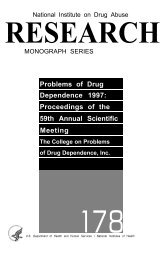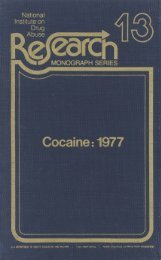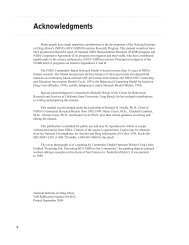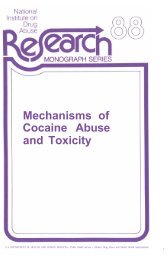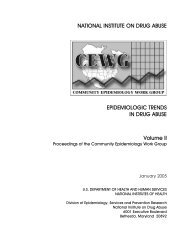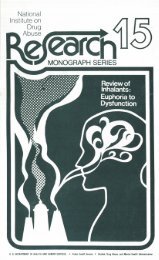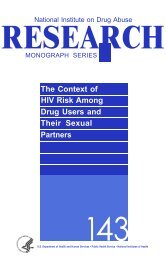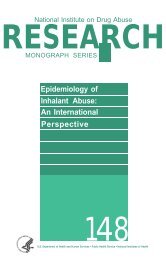Research on Cocaine - Archives - National Institute on Drug Abuse
Research on Cocaine - Archives - National Institute on Drug Abuse
Research on Cocaine - Archives - National Institute on Drug Abuse
You also want an ePaper? Increase the reach of your titles
YUMPU automatically turns print PDFs into web optimized ePapers that Google loves.
8<br />
<str<strong>on</strong>g>Research</str<strong>on</strong>g> Findings<br />
Volume Volume 22, Number #, Number 2 (December (M<strong>on</strong>th 2008) Year)<br />
Aripiprazole Prevents Rats From Resuming <strong>Cocaine</strong> Seeking<br />
A medicati<strong>on</strong> prescribed for schizophrenia and manic phases of bipolar disorder shows promise as a<br />
cocaine addicti<strong>on</strong> treatment.<br />
By Lori Whitten, NIDA Notes Staff Writer<br />
The antipsychotic medicati<strong>on</strong> aripiprazole appears to<br />
reduce cocaine craving in small studies of addicted individuals<br />
with schizophrenia and bipolar disorder. A recent<br />
NIDA-funded experiment suggests that aripiprazole may<br />
help not <strong>on</strong>ly those very-difficult-to-treat individuals, but<br />
others as well, to maintain abstinence from the stimulant.<br />
Drs. R<strong>on</strong>ald See and Matthew Feltenstein of the Medical<br />
University of South Carolina found that rats treated with<br />
aripiprazole were less likely than untreated rats to resume<br />
cocaine self-administrati<strong>on</strong> after a period of abstinence.<br />
The finding indicates that the medicati<strong>on</strong> reduces cocaine<br />
seeking directly rather than as a byproduct of altering psychotic<br />
symptoms or processes. Therefore, the researchers<br />
speculate, cocaine abusers who do not have c<strong>on</strong>current<br />
psychotic illness may also benefit from aripiprazole.<br />
Indifference to <strong>Cocaine</strong> With Few Side Effects<br />
The researchers subjected rats to a protocol that simulates<br />
drug use, followed by the establishment of stable abstinence,<br />
and finally a test of the animals’ vulnerability to<br />
relapse. Animals that are vulnerable resp<strong>on</strong>d to a relapse<br />
trigger—a cocaine-associated cue or a priming dose of<br />
the drug—by pressing a lever they previously used to selfadminister<br />
the drug. The more vulnerable an animal is,<br />
the more often it will press the lever.<br />
Rats given the lowest effective dose of aripiprazole (0.25<br />
mg/kg) before the priming dose of cocaine pressed the<br />
lever associated with cocaine 50 percent as often as c<strong>on</strong>trol<br />
rats did. The higher the dose of aripiprazole, the less the<br />
rats resp<strong>on</strong>ded to the relapse triggers. For example, after<br />
the drug trigger, rats given the highest dose of aripiprazole<br />
(15 mg/kg) pressed the lever associated with cocaine <strong>on</strong>ly<br />
9 percent as often as the rats receiving no aripiprazole.<br />
To rule out the possibility that aripiprazole reduced the<br />
rats’ cocaine seeking through general effects—such as<br />
sedati<strong>on</strong> or lethargy—that would be undesirable in a<br />
medicati<strong>on</strong>, the investigators c<strong>on</strong>ducted further trials that<br />
showed:<br />
• Aripiprazole does not sedate animals to the point where<br />
they are too tired to approach and press levers for<br />
rewards. During the protocol that mimicked relapse,<br />
the lowest medicati<strong>on</strong> doses that attenuated lever<br />
pressing did not suppress locomotor activity. Higher<br />
doses (1 mg/kg and 5 mg/kg) reduced sp<strong>on</strong>taneous<br />
and cocaine-induced locomotor activity <strong>on</strong>ly modestly.<br />
Furthermore, while aripiprazole-treated rats<br />
pressed the drug-linked lever less often, they c<strong>on</strong>tinued<br />
to press another lever, which delivered nothing at<br />
all, as often as before.<br />
• Aripiprazole does not make rats indifferent to rewards<br />
from all activities, including natural, healthy <strong>on</strong>es.<br />
Aripiprazole did not reduce the enthusiasm with<br />
which rats pressed levers to obtain food, so it did not<br />
seem to blunt their natural pleasure resp<strong>on</strong>ses. In<br />
additi<strong>on</strong>, when the researchers put animals through a<br />
protocol that simulates <strong>on</strong>going drug use, rather than<br />
recovery from an addicti<strong>on</strong>, the animals pressed levers<br />
to obtain cocaine infusi<strong>on</strong>s just as avidly after receiv-


